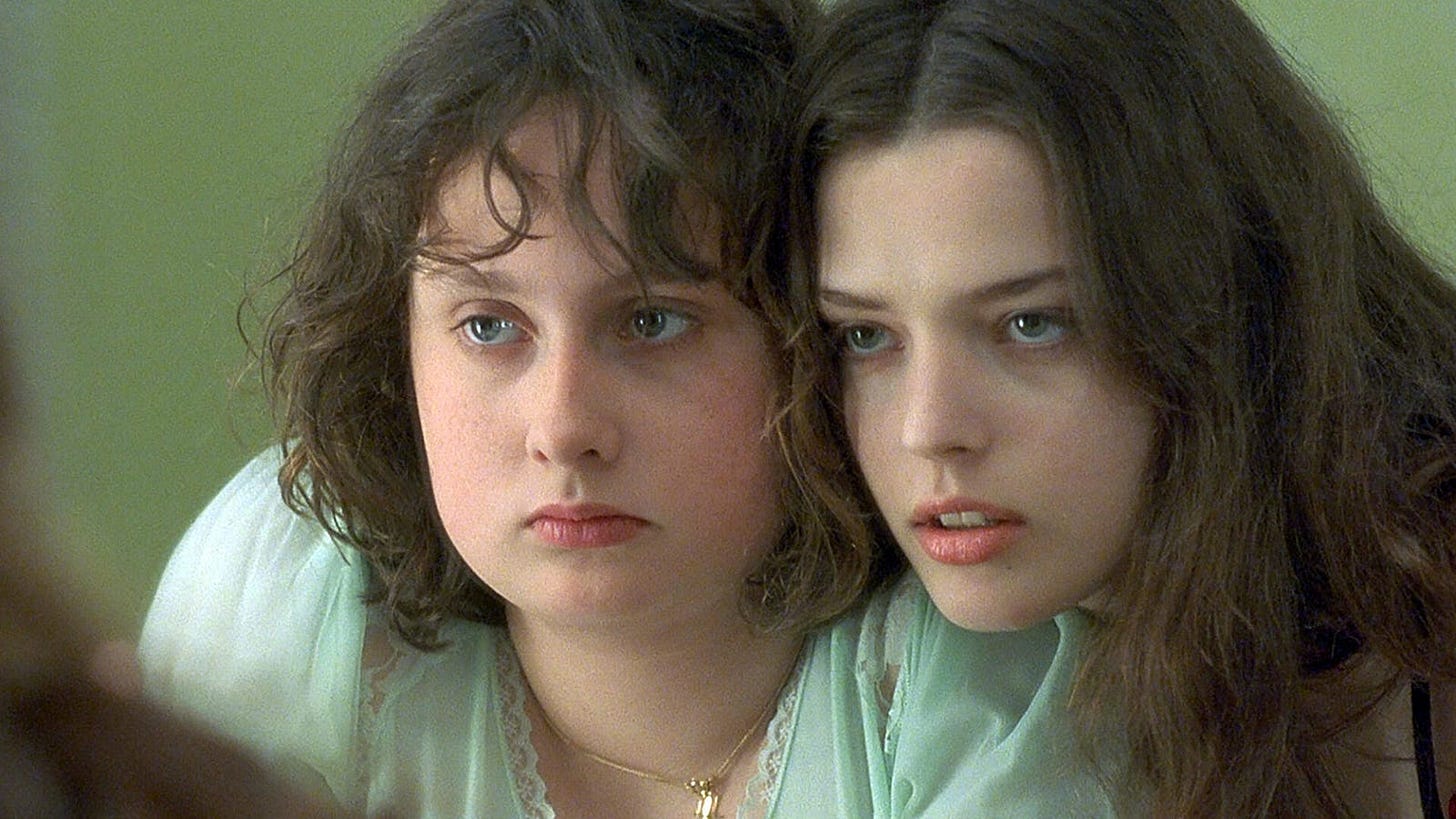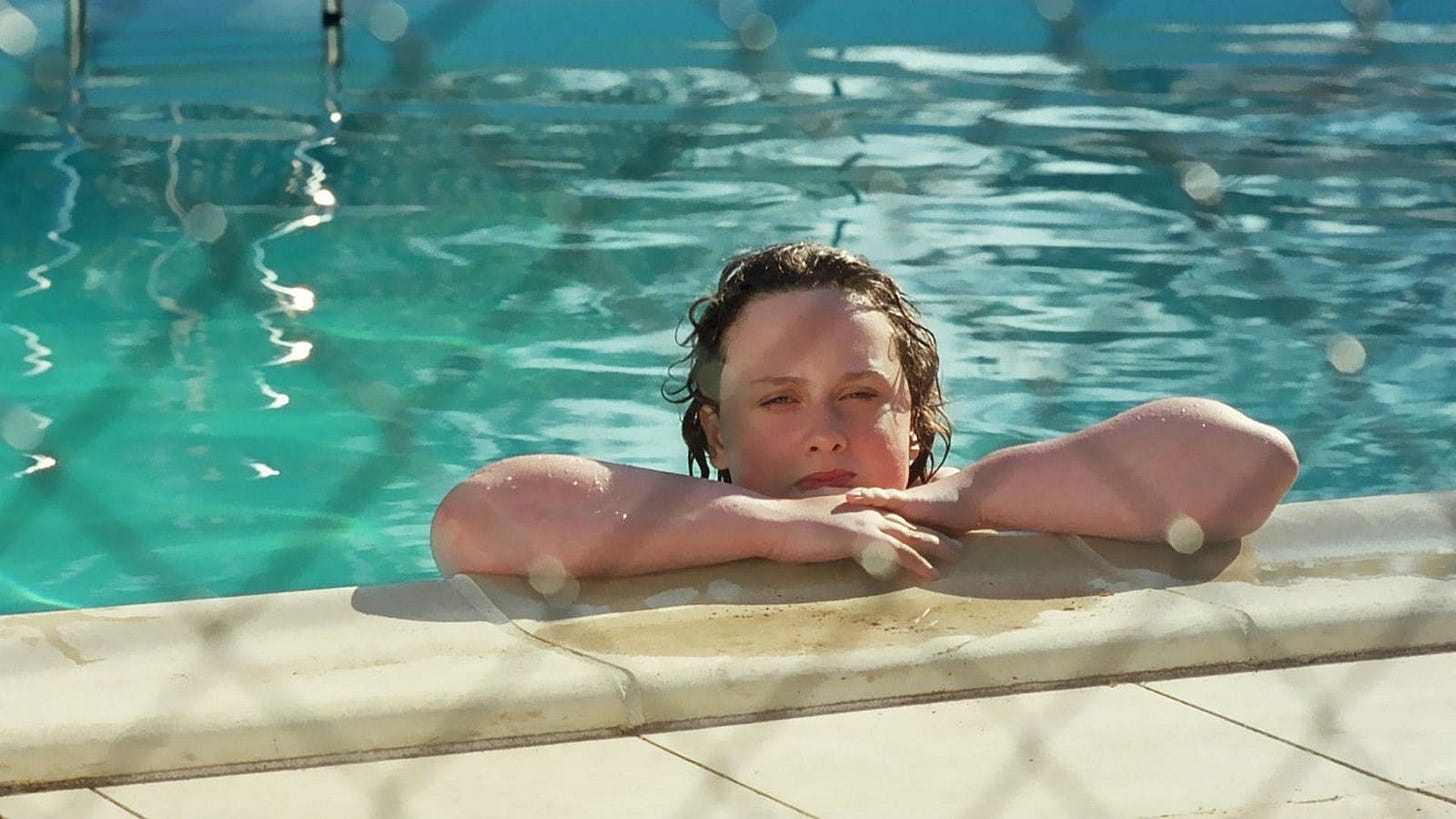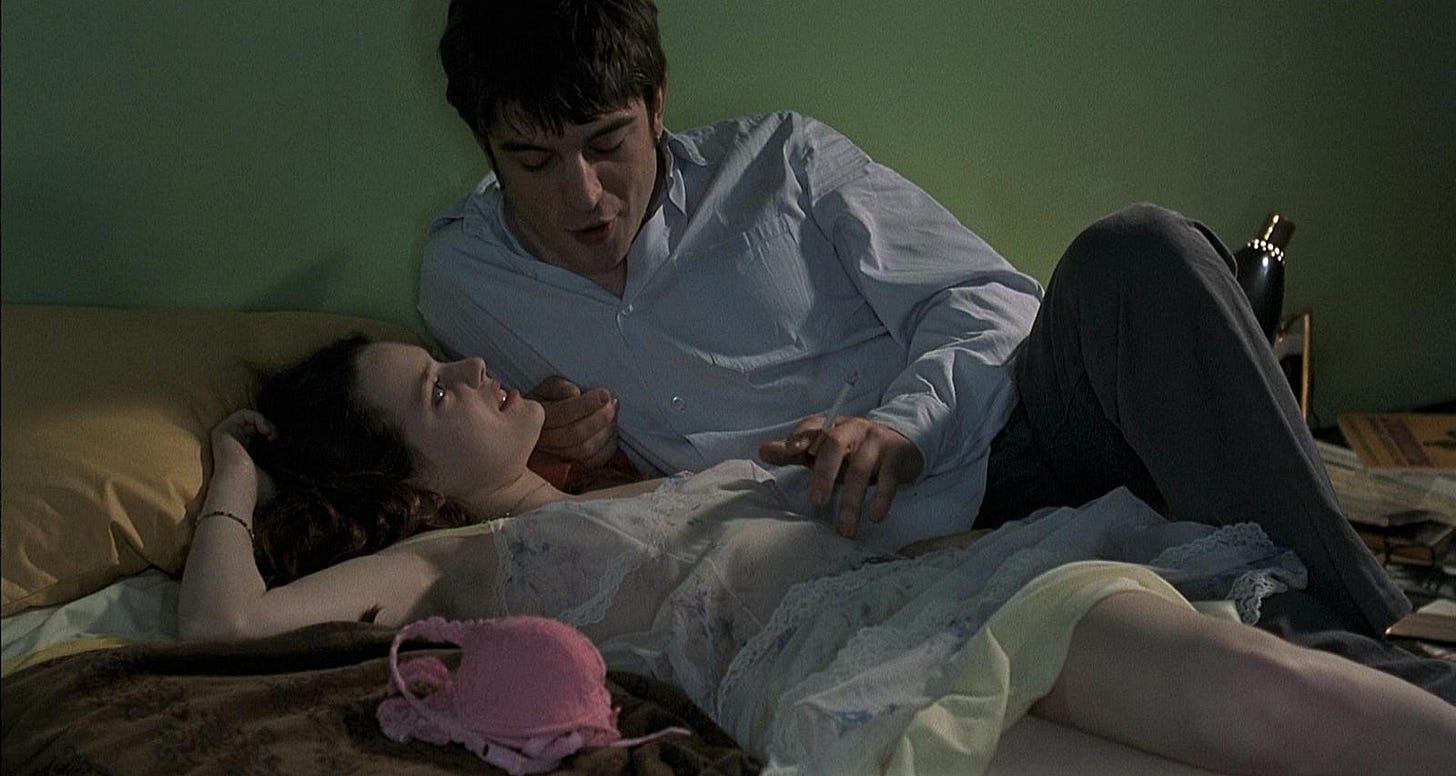Review: ‘Fat Girl’ — Cruel Coming of Age Story Becomes Exploitative and Shocking
Catherine Breillat’s controversial 2001 film is a provocative, corrosive experience

Trigger warning — this review will discuss the sexual assault of two adolescent characters as seen in Fat Girl.
Somehow, Fat Girl’s mean title — targeted at its protagonist, Anaïs, who is played by the then merely 13 years old Anaïs Reboux — is perhaps one of its least cruel elements as a film. No, really; in its brief 85 minute running time, Fat Girl (originally titled A ma soeur! or ‘To my sister!’) leaves an impression not like those usually gleaned from art films or coming of age dramas. Rather, one sits through the credits scroll in a numbed, stunned silence feeling more as though they have just finished an outright horror film.
But let’s go back a little for now and look at the film’s bigger picture, rather than just the barrage of brutality in its last couple of minutes. Fat Girl follows the aforementioned Anaïs, a twelve year old girl on holiday with her family which includes her cruel older (fifteen years old) sister Elena (Roxane Mesquida), her mother (Arsinee Khanjian) and her father (Romain Goupil). Bored and lonely, Anaïs spends most of her time trailing her older sister despite their tumultuous love/hate relationship which sees Elena belittle her sister because of her weight. The two girls meet a young man while wandering around named Fernando (Libero De Rienzo), an Italian law student who quickly shows interest in the more conventionally attractive Elena. The two leave in Fernando’s car, with Anaïs left to wander home by herself.
The first act of Fat Girl is focused on Anaïs in her loneliness and in her longing to grow up more quickly, establishing the beginnings of her interests in boys as she swims back and forth between a rail and a plank of wood speaking to both as though they were her lovers and having the two inanimate objects essentially fight over her. She is both in awe and jealous of Elena, wishing to look more like her and to fit a certain more socially accepted image of a ‘woman’. Reboux plays Anaïs lonesome sadness perfectly, her melancholic facial expressions potent and striking, while the rhythm in Pascale Chavance’s editing and the film’s casual slowness adds to that sense of being isolated and bored, meandering along. But Fat Girl becomes a much more interesting film when it steps slightly away from Anaïs and instead starts to pay attention to Elena’s blossoming relationship with Fernando from meeting to a first dinner date (marked mainly by Elena saying that simply watching Anaïs eat causes her to lose her own appetite) with Elena and Anaïs’ aloof, inattentive parents.
In an extended sequence, we see Anaïs and Elena talking to one another in bed as Elena starts to put on make-up. It is revealed that she has invited Fernando over in the night to sleep beside her as Elena tells Anaïs to mind her own business and not to say a word about the two meeting. The camera then focuses itself upon Elena and Fernando as the two start to fool around more seriously, moving slowly from innocence and kisses to Fernando removing Elena’s bra and starting to convince her to have sex with him despite the fact that she is 15 and he is, seemingly, in his early 20s. Fernando is never outright aggressive, but he is clearly manipulative and he starts to twist his and Elena’s words in a prolonged effort to convince an unsure Elena to have sex with him as he starts to close off her reasons for saying no and make her feel guilty. At first, when Fernando sees Elena’s uncertainty and fear, he tries to tell her that — because he is a man — he will have no choice if she refuses him but to sleep with somebody else, somebody who he doesn’t love, and that that would hurt him emotionally. He says that if she makes him leave without having sex with him, he will either cheat on her or have to masturbate in the bathroom, both of which make him ‘sick’. Fernando blames Elena directly for winding him up sexually, saying that he didn’t do anything to her before then distracting himself by speaking about how he has previously gotten a ‘kick’ out of going on dates with women and getting them extremely drunk before leaving them.

Fernando’s creepiness is focused on with an uneasy intensity, Giorgos Arvanitis’ camera never looking away even when focusing partially on Anaïs in the background with a slow pan that reminds the audience of her presence in the room. The discomfort continues as Fernando becomes more intense, telling Elena that she must learn to ‘forgive men’ and that she is a ‘little girl who looks like a woman’, fetishising her youth and highlighting his awareness of their uncomfortable age gap. Eventually, Fernando tells Elena that the two should have anal intercourse because it ‘doesn’t count’ as Elena losing her virginity and so she has nothing to fear, telling her that she will agree to do it ‘if you love me’ and ‘if you were kind’. The scene concludes by cutting away to Anaïs, listening with a muted expression on her face as her sister groans in pain as Fernando sexually assaults her. It’s an absolutely crushing sequence, its patience predatory and troubling, its point about men controlling and manipulating women into sex blunt and abrasive. It’s certainly an effective and impactful moment, but obviously one that sparked quite the controversy.
That controversy is doubled down upon throughout Fat Girl as Breillat continues to push further into this larger point about how men control women in relationships, particularly when it comes to sex. When leaving, despite getting what he wanted in the end, Fernando’s manipulation continues as he tells Elena that if she won’t lose her virginity to him the next time they meet, he might leave her. Elena, naive and too young to put her emotions for Fernando aside for long enough to realise that she is being forced into sex that she doesn’t want, continues to go along with whatever he says even as he explains that the idea itself of taking Elena’s virginity turns him on more.
Elsewhere, Breillat shows a less brutal but still controlling patriarchal element to Anaïs’ home life more generally. Beyond the film’s clearest comment upon the exploitation of women’s bodies (Anaïs’ constantly being insulted and mocked for not meeting beauty standards or being attractive to men despite the fact that she is only twelve years old), there is an iciness to its nuclear family that sees the father leave the family holiday early because of his lacking interest in his family and which also sees Anaïs insulted for being upset rather than empathised with. In one scene, Anaïs openly sobs at the breakfast table. Her father asks what is wrong, Anaïs says nothing, and everybody moves on with barely another thing said about it other than a comment from Elena — that food will cheer Anaïs up, before practically force-feeding her in an effort to force her to accompany her to see Fernando so that she can hide him from her parents, innocently pretending that she is going out with just her sister instead. There is a blatant emotional ignorance there that is mirrored by Fernando, and Breillat intelligently, and subtly, shows how similar manipulation and control as experienced by Elena has impacted her mother over decades rather than immediately. The girls’ mother seems numb to most things, can be violent and her few attempts at empathy towards her girls are often overshadowed by harshness from the father. It’s much more subtle than what Elena experiences throughout the film, but it is still a clear comment on male dominance over the women they supposedly love.
Later on, Fernando takes Elena’s virginity and it is as sad and disturbing as their last sexual encounter. Elena asks Fernando to be gentle and not to hurt her, to which he flatly says ‘no’ before starting to have sex with her. Breillat brilliantly positions the camera in this moment so that the sex is barely visible in the background, the visual focus in fact on a helpless Anaïs who is turned to face the wall and crying. Breillat remains agonisingly direct in her approach, making a film that is outright stomach turning and difficult to watch, but her craftsmanship and artistry is bold and impactful.

Soon, Elena’s parents discover her affair with Fernando and the girls’ father demand that the family go home immediately. He intends to have Elena ‘checked’ medically, to see if she has lost her virginity or not, in yet another bodily invasion against the will of the person experiencing it. The scene following the family driving home is painfully slow, stretching out and starting to bubble with tension. Long gone is the ache of loneliness, it has by now been replaced with a discomfort equivalent to that of a horror film as the car edges slowly across the motorway. It is difficult to explain exactly why, because nothing within the film specifically seems to prompt the feeling, but there is a great anxiety, a major sense that at any moment something intense is going to happen to these characters. Breillat misdirects the viewer a number of times as the scene continues — the girls are together in a small car driving between huge trucks (almost any other film would remove this scene as it isn’t narratively meaningful, while Breillat keeps it in so that the viewer is forever wondering why they’re seeing this moment, waiting for something to happen without knowing exactly what to expect) and later on when the mother stops the car to sleep before driving further in the morning, we see Elena leave the car and the camera stops to follow a truck that looms by, driven by a middle aged man. Given what has come before in the film, the expectation is immediate — Elena is going to be attacked.
Instead, (full spoilers) Elena soon returns to the car where Anaïs sits silently in the back seat eating, their mother asleep. It is a rare moment of quiet until, very suddenly, a man smashes through the windscreen and hits Elena over the head with a blunt object. He grabs at the mother, tearing off her shirt. Anaïs, in the back seat, wets herself and gets out of the car. We see the man grab her and drag her along into the woods.
Now, this is where it is very important to state that I saw this film on a U.K. DVD which cuts out a moment in the film deemed possible to be used by paedophiles to groom their victims. What I thought was a clever use of narrative ellipsis, skipping past what happens in the woods as a way to leave the film wickedly open-ended and to force it to linger in the mind, is in fact a cut by the BBFC which removes a scene in which the young Anaïs ‘appears to consent to being raped’ by the man. Instead, the cut version of the film cuts from the two entering the woods to the next morning as Elena is dead, her body being checked over by forensics. The girls’ mother seems dead, too, her clothes torn and ragged. Policemen have found Anaïs and walk her out of the woods, telling their superiors that Anaïs claims not to have been sexually assaulted by the man from the night before.
That cut, of course, re-contextualises the final scene because it leaves a question about what happened the night before. Learning that the film was cut and removed such a horrible scene does alter my perception of the film as a whole, confusing its ideas a little perhaps because of Breillat’s unflinching, harsh representation of sex. Douglas Keesey explains that ‘in the midst of the rape, Anaïs stops trying to push the rapist off with her arms and instead puts them around his shoulders in an embrace. If our point of identification in the scene is Anaïs, has she just moved from fighting to acceptance of the rape? It could be argued that she ‘acquiesces’ solely to ensure her survival, but one can see how the BBFC might be concerned about a paedophile viewer showing Anaïs’ embrace of her rapist to a potential victim as a model of how to consent to rape. This concern is only heightened right after this scene when we find out that Anaïs herself claims that she “wasn’t raped”’. And the choice to cut such a scene certainly makes sense, as without it the film’s point regarding male dominance is still so keenly felt.

In fact, that point is felt from that first sequence between Fernando and Elena in the latter’s bed, when he manipulates her into anal sex against her will. From that point on, the film is merely emphasising its point and making it all the more indelible to the viewer. Breillat’s choice to opt for such a controversial and shock-value-driven finale makes sense when thinking of the film as a sort of political act, but is it actually necessary to making its point to a viewer? Not really… It will certainly have ensured that the film became more controversial and widely discussed, but it doesn’t seem necessary for somebody who was already seeing the film and who has already seen Breillat’s representation of male dominance and control.
Breillat’s incredible harshness seems unnecessary. While she is clearly a filmmaker capable of making a quality film — Fat Girl is good! It is very well acted, its cinematography and editing are terrific, it is pointed and thoughtful, and so on — her need to move into such extremes feels almost detrimental overall, shaking her viewer to such an extent that they’re likely to outright reject the film. If her intention is to disturb and to leave a lasting impression, she passes with flying colours. Otherwise, she crosses a line with that cut scene — the film is already difficult to watch with that sequence removed, never mind with it left in. While its statement is obvious — that Anaïs’ growing interest in boys and the way that she has been made to feel unattractive has led her to accept any sexual attention as positive, despite its clear negativity and brutality — Breillat’s need to stoop to such a scene is a step too far.
A brutal, disturbing film for a number of reasons, Fat Girl ought to be approached with caution (if approached at all). My effort to go in blind came back to bite me, and the research into its cut final scene only made things worse. It is certainly an effective film with a scathing point made regarding sex and dominance and men’s tendency to dehumanise women when sexually attracted to them, but by its end it is outright numbing, its final screeching cry a scene that massively disrupts the rhythm of the rest of the film so that it stands out all the more. A sad interrogation of coming of age and starting to understand sex is turned far bleaker by that moment, moving away from a study of sisterhood, rivalry, the need to be attractive to avoid alienation and loneliness towards something that I just cannot accept as necessary. Some will admire Breillat’s insistence on her thesis and her audaciousness, but it is one step too far towards exploitation in my eyes, one of the most shocking and abrasive films I’ve seen in many years because of its ability to take innocence and place it so intentionally next to the depths of depravity.



